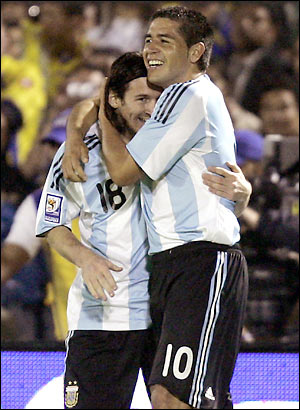Too good to be true
At the club level, 2007 couldn't have been better. Not only did Argentine clubs win both the Copa Libertadores and Copa Sudamericana, but also the upbeat trend of smaller clubs rising to prominence continued.
What was particularly impressive was the determination of Argentina's less fashionable clubs: Lanús shocked the nation by winning the Apertura Championship, while Arsenal went a step further by lifting the Copa Sudamericana.
Lanús' incredible title run could be considered one of the greatest campaigns in recent history. The cash-strapped club, which had never won a domestic title in 92 years of existence, went undefeated in its final 10 league matches and clinched a title that seemed to be out of its reach.
Not only did Lanús play a very attractive style of soccer under Spanish-born coach Ramón Cabrero, but it also ended up as the league's highest-scoring team with 34 goals, an achievement usually achieved by the likes of Boca Juniors, River Plate or Independiente.
In the Clausura Championship, San Lorenzo, which hadn't come close to challenging for the title in a number of years (14 short seasons), won 14 of its 19 league matches and ended the season as huge six-point winners. El Ciclón went undefeated in its four clásicos against the major Buenos Aires clubs, including a historic 3-0 victory over Boca at the Bombonera.
But internationally, it was surprise package Arsenal that made a stand with the Sudamericana title. The tiny club from Sarandí, which had no right to even make a claim in the competition, swept away a number of higher-profile teams, including San Lorenzo, Chivas de Guadalajara, River and Club América, before winning its first-ever title.
Many boil Arsenal's success down to the fighting spirit of the side, its determination and aggressiveness on the field. That was exactly the manner in which Arsenal won the title, as it came from behind to beat América on the away-goals rule with a late strike in the title decider in Avellaneda, Buenos Aires. Arsenal proved that no matter the circumstances, smaller clubs are more than capable of defying the odds if they set their minds to it.
Then again, it was one of Argentina's major clubs that won South America's ultimate club competition, the Copa Libertadores. Boca Juniors brushed aside all opposition on the way to their sixth title, capping it off with an emphatic 5-0 aggregate victory over Brazilian side Grêmio of Porto Alegre in the finals last June.
It was a hugely important victory for Argentine soccer in general, as its clubs hadn't lifted the Libertadores title since Boca beat Santos in the decider back in 2003. Over the past couple of years, Argentine clubs had to put up with watching two consecutive all-Brazilian finals (São Paulo vs. Atlético Paranaense in '05 and São Paulo vs. Internacional in '06).
But despite all these steps forward, the year didn't end in the best possible way for Argentine clubs. Boca, whose Libertadores title gave it the right to participate in the FIFA Club World Cup in Japan, reached the final of the competition, but suffered a painful 4-2 defeat to European champion AC Milan in Yokohama on Sunday.
Had Boca not sold the backbone of its Libertadores-winning side, it could have been a different story. But the absences of Daniel Díaz, ClementeRodríguez and, in particular, essential playmaker Juan Román Riquelme (who returned to the club, but wasn't short-listed in time for the competition) had a huge effect on the team.
At the national-team level, it could be considered a bad year for Argentina after its disappointing Copa América campaign in Venezuela. Alfio Basile's team won its first five matches as it advanced to the final of the competition (scoring an unmatched total of 16 goals) before being crushed 3-0 by a superior Brazil squad in the decider.
The likes of Riquelme, Lionel Messi and Carlos Tévez didn't show up in the title match in Maracaibo, and Argentina failed to win its second consecutive final against the Brazilians, and its first international trophy in 14 years.
There's no doubt times have been extremely tough for the national team. It started off its 2010 World Cup qualifying campaign in style, winning its first three matches (with seven goals in favor and none against). But when it faced its first real test, a visit to Bogotá to face Colombia in late November, it suffered a 2-1 defeat.
It's often hard to reconcile why Argentina keeps letting down the fans while it boasts arguably the most talented squad of players on the planet. Just ask soccer's governing body: According to the official FIFA World Rankings, Argentina ends the year as the No. 1 team in the world. Some consolation for its efforts, but the truth is that Argentina has to improve a great deal if it wants to win a title of some significance in the near future.
Even so, Argentine soccer has experienced a relatively good year in terms of overall improvement. The national team may have failed at the final hurdle once again, but it could be just a matter of time before it wins a major title.
On the local front, the level of competition in the Argentina first division was of the highest order. That internal quality has allowed for the emergence of new powers, both on the local and international scene. One can't help but hope the laundry list of positives during this past year will translate to even bigger things for Argentina in '08 and beyond.





